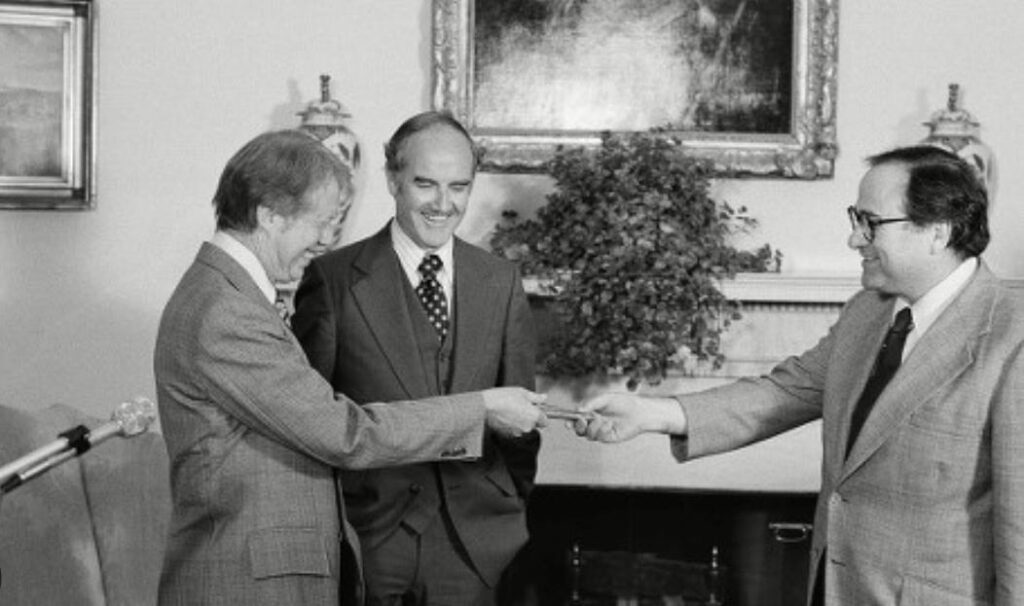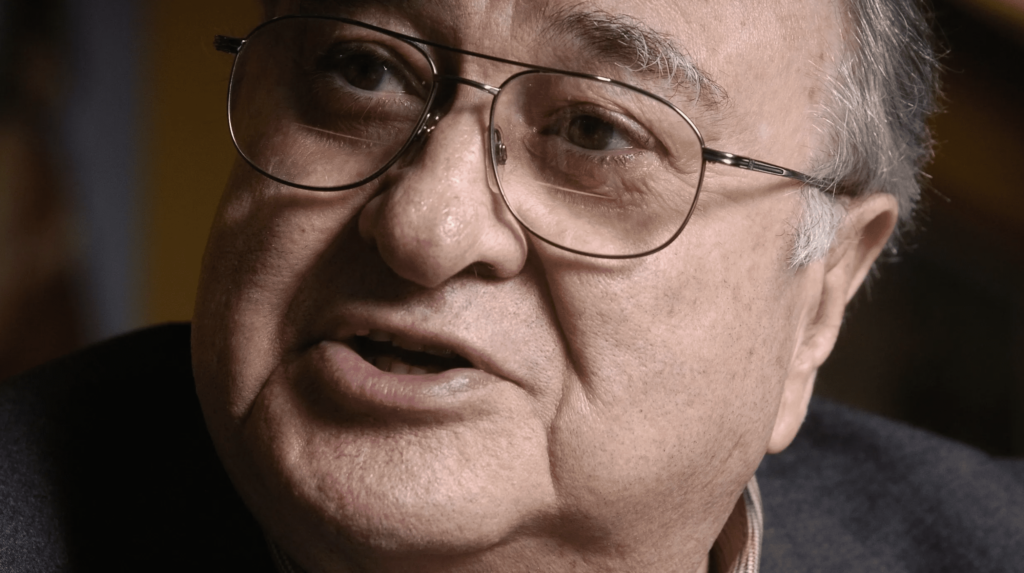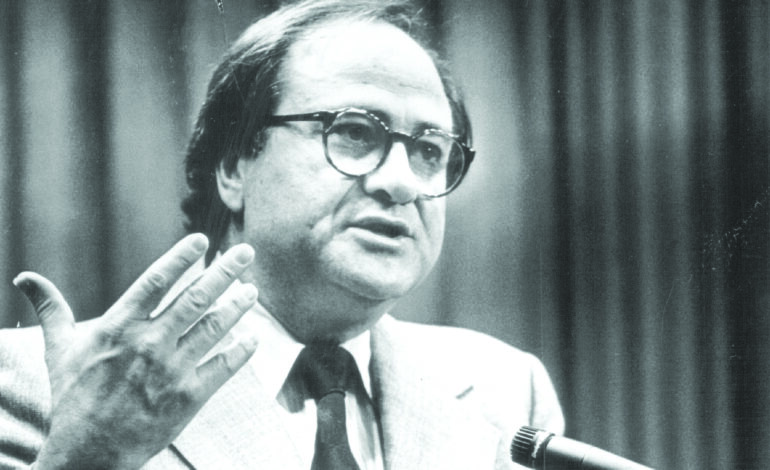James Abourezk, a South Dakota Democrat who grew up on the Rosebud Indian Reservation, became the first Arab American U.S. senator and was known for his quick wit as he advocated for populist causes, died Friday. He was 92.
Abourezk died at his home in Sioux Falls on his birthday after entering hospice care earlier this week, his son, Charles Abourezk said. While in hospice, Abourezk was surrounded by his wife, Sanaa, and other family members.
Abourezk represented South Dakota for single terms in the U.S. House and U.S. Senate during the 1970s, where he exemplified a brand of Democratic politician known as Prairie Populist. He fought passionately — and with humor — for those he felt were the downtrodden: Farmers, consumers and Native American people.
Abourezk was the first chair of the Senate Committee on Indian Affairs and successfully pressed for the American Indian Policy Review Commission. It produced a comprehensive review of federal policy with American Indian tribes and sparked the Indian Self-Determination and Education Assistance Act, the American Indian Religious Freedom Act and the Indian Child Welfare Act — a landmark piece of legislation meant to cut down on the alarming rate at which Native American children were taken from their homes and placed with White families.
When the American Indian Movement seized and occupied Wounded Knee, South Dakota, in 1973 to protest the federal government’s treatment of Native American tribes, Abourezk and fellow South Dakota Democrat Sen. George McGovern traveled to Wounded Knee to negotiate with activists in a standoff with federal law enforcement.
Abourezk also mounted an unsuccessful effort against natural gas deregulation that raised prices for consumers and became an outspoken critic of U.S. policy in the Middle East. He declined to run for reelection in 1978.
“He was courageous, he was outspoken,” said Tom Daschle, the former Senate Democratic leader who started his political career as an aide to Abourezk. “I give him great credit for his advocacy of human rights, especially of the need to recognize the Arab American community in the United States. He was a lone voice for many years.”
U.S. Sen. Mike Rounds, a South Dakota Republican, said on Twitter that Abourezk was a “true public servant” who left his mark as he advocated for tribes in the state.
Abourezk’s causes often ran afoul of Washington’s political establishment. He jabbed back with banter.
“He was a great storyteller; he had great humor; he was quick-witted and people loved to be around him,” Daschle said.
In Abourezk’s 1989 memoir, he wrote of the Senate, “Where else are your doors opened for you, is your travel all over the world provided free of charge, can you meet with world leaders who would otherwise never let you into their countries, have your bad jokes laughed at and your boring speeches applauded? It’s the ultimate place to have one’s ego massaged, over and over.”
The trappings of the Senate were another world from Abourezk’s rough-and-tumble childhood on the Rosebud Indian Reservation, where his Lebanese parents had immigrated and ran a general store.
He told colorful tales in his memoir of adolescent adventure: He learned to shoot pool at a local saloon called the Bloody Bucket; drove his father’s car backward to reverse the mileage put on the odometer from an unauthorized, 17-mile trip to see a girlfriend and challenged a group of school bullies to a fight to distract them from picking on another student.

Carter, McGovern and Abourezk. – Photo courtesy of the White House.
He didn’t win the fight, Abourezk wrote in his memoir, Advise and Dissent. But the bullies left him and the other student alone: “It turned out no one was anxious to tangle with even a sure loser.”
Abourezk served four years in the U.S. Navy following World War II. Upon returning to South Dakota, he married his first wife, Mary Ann Houlton, and had three children: Charles, Nikki and Paul. He worked a series of jobs, including as a rancher, blackjack dealer and judo instructor, and then earned a degree in civil engineering from the South Dakota School of Mines.
His job as a civil engineer took him to California, then back to South Dakota, where he worked on the Minuteman missile silos in the western part of the state. He attended law school and opened a solo practice in Rapid City.
Abourezk ran for South Dakota attorney general in 1968 and lost. But he remained undeterred from entering politics and narrowly won a U.S. House seat in 1970. Two years later, he jumped to the Senate. During his term there, he was a seatmate to both former Sens. Joe Biden and Edward Kennedy.
He led a delegation from South Dakota, including members of the University of South Dakota basketball team, to Cuba for a game with the Cuban national basketball team. During the trip, he met with Fidel Castro.
Abourezk also became an outspoken critic of Israel and U.S. foreign policy in the Middle East after touring the region and visiting his parents’ hometown in Lebanon as a senator. The position lost him many political allies and he decided to retire from the Senate after a single term.
Abourezk returned to practicing law in Washington and founded the American-Arab Anti-Discrimination Committee in 1980, where he passionately and colorfully denounced Israeli aggression in the Middle East.

James Abourezk
National and local Arab Americans speak about Abourezk’s legacy
“The community has lost a true leader and generational figure for Arab Americans,” ADC Chairman Dr. Safa Rifka said. “Our thoughts and prayers are with his wife, children and family. Jim has left behind a legacy and we will continue to honor and build on it here at ADC. I will forever be thankful for his leadership, guidance and perseverance. He was always an integral part of our community, significantly contributing to the story of Arab Americans. He was a generous trailblazer, paving the way for others with his leadership. Jim always stood for what is right and he always stood steadfast for justice here at home and abroad.”
“Generations of Arab Americans, including myself, have benefited from his work and legacy,” ADC National Executive Director Abed Ayoub said. “Jim always stood for what is right and advanced the rights of our community with adventure, compassion, humor and love. At ADC we will honor his memory and legacy by continuing to work towards the noble mission he laid out for the organization over 40 years ago.”
“I loved Jim, he was a mentor and a friend,” prominent attorney and former ADC Vice-Chairman and President Abdeen Jabara said. “He gave us guidance and direction. His death is a loss for humanity.”
“It is a sad day for Arab Americans across the country,” said Nabih Ayad, an attorney and founder of the Arab American Civil Rights League (ACRL). “Senator Abourezk meant so much to so many Arab Americans. He showed how far a son of Lebanese immigrant parents can rise in the U.S.”
“Senator Abourezk was a class act, a remarkable man whose vision made a huge difference in the lives of Arab Americans,” said Imad Hamad, executive director of the American Human Rights Council (AHRC). “He is a source of pride to all Arab Americans and others who have devoted their lives to the fighting against all forms of illegal discrimination.”
Osama Siblani, publisher of The Arab American News, remembered Senator Abourezk visiting The Arab American News offices in 1985, only four years after he’d established the American Arab Anti-Discrimination Committee in the nation’s capital. Abourezk encouraged Siblani on his initiative of publishing a national Arab American publication.
“Senator Aburezk was a source of pride to all Arab Americans,” Siblani said. “He spoke against Arab discrimination when no one dared to speak out. Current and future Arab American generations should always remember his outstanding courage. I strongly believe that as a community we owe a great gratitude and respect for the vision and courage of this exceptional leader who raised his voice on behalf of all of us when we didn’t have a voice in this country.”
Abourezk divorced his first wife in 1980.
He then married Margaret Bethea in 1982. They later divorced.
He set up a law practice in Rapid City, where he specialized in American Indian law, but also remained active in advocacy on international policy.
At an embassy event in Washington, he met Sanaa Abourezk, a restaurateur. They were married in 1991 and several years later moved to Sioux Falls where she opened an award-winning restaurant.
In addition to his wife, he is survived by four children, Charles Abourezk, Nikki Pipe On Head, Paul Abourezk and Alya Abourezk; step-daughter, Chelsea Machad; and many grandchildren and great-grandchildren.






Leave a Reply